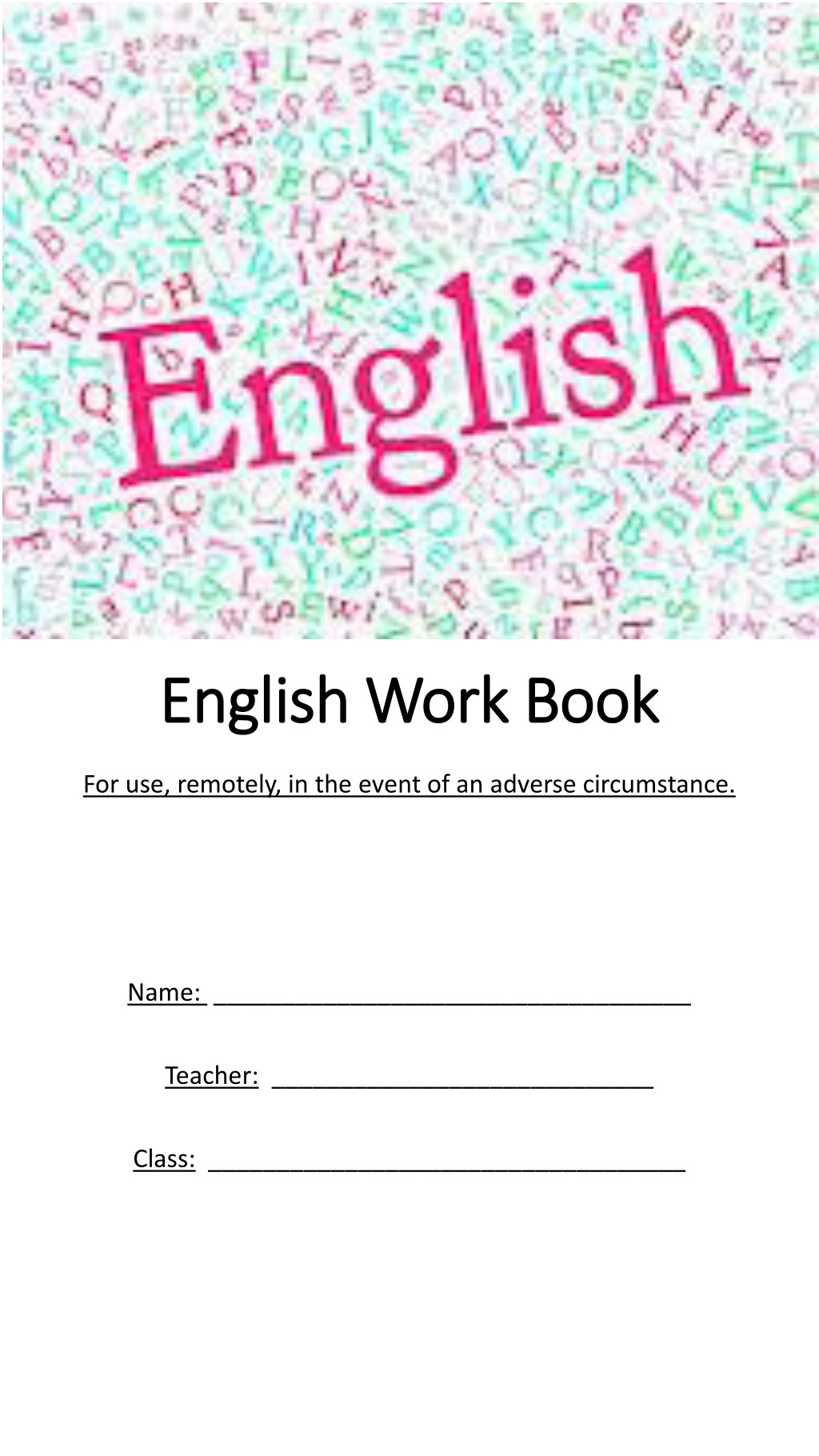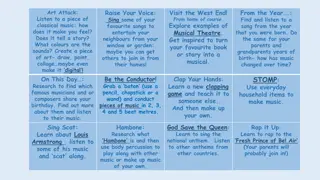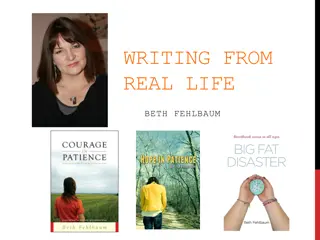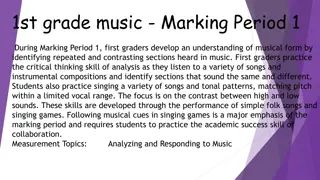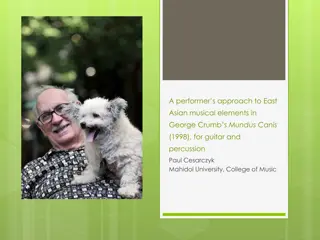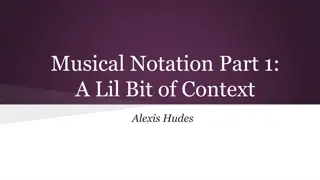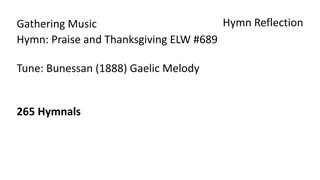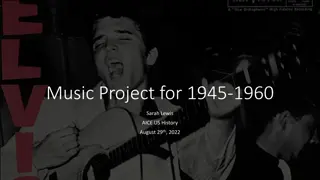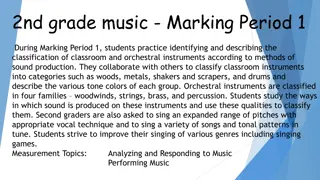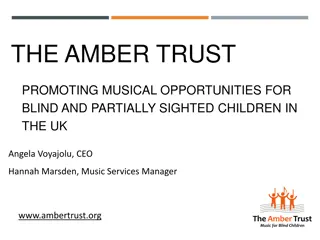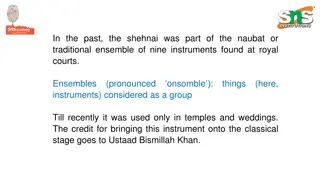Beth's Musical Journey in "Little Women
Beth, one of the March sisters in "Little Women," struggles to overcome her shyness to pursue her passion for music. Despite her yearning for the grand piano at Mr. Laurence's house, her timidity holds her back. Beth's internal conflict and determination to follow her love for music are beautifully portrayed in this passage, showcasing her journey of growth and self-discovery within the constraints of societal expectations and her own insecurities.
Download Presentation

Please find below an Image/Link to download the presentation.
The content on the website is provided AS IS for your information and personal use only. It may not be sold, licensed, or shared on other websites without obtaining consent from the author. Download presentation by click this link. If you encounter any issues during the download, it is possible that the publisher has removed the file from their server.
E N D
Presentation Transcript
English Work Book English Work Book For use, remotely, in the event of an adverse circumstance. Name: ___________________________________ Teacher: ____________________________ Class: ___________________________________
Lesson One: Non Lesson One: Non- -fiction writing. Date: ______________________ Date: ______________________ fiction writing. Pathos: Emotions/Values Your writing must contain moving language, stories and appeals to the audience. Ethos-Pathos-Logos Logos: Logic/Reason Your writing must be logically structured and contain factual information as proof. Ethos: Credibility/Trust Your writing must present you as an expert on the topic with similar beliefs to your audience. Text type Audience Purpose Write the opening two paragraphs of an article for a school magazine, discussing your opinion on the above statement. Using this space, explore this statement (mind map/list/table) to plan your response.
Modelled response When I open my timeline, what do I see? Pouting selfie after pouting selfie, filtered face after filtered face. And all for what exactly? Teenagers take endless amounts of selfies, in order to seek approval from their peers and- in most cases- strangers. We have raised a generation of teenagers who care only about how many likes they have achieved on Instagram that day. Should they not be focussing on their academic study? Should they not be concerned with spending time with their family? Should they not be revising? Now you must write the opening two paragraphs of an article, from your own perspective. Use the space below to do so: _________________________________________________ _________________________________________________ _________________________________________________ _________________________________________________ _________________________________________________ _________________________________________________ _________________________________________________ _________________________________________________ _________________________________________________ _________________________________________________ _________________________________________________ _________________________________________________ _________________________________________________ _________________________________________________ _________________________________________________ _________________________________________________ _________________________________________________
Lesson two: Lesson two: Little Women Little Women. . Date: ______________________ Date: ______________________ Little Women was written in 1868 and is one of the most beloved children s books of all time. It is the story of the four March sisters: Meg, Jo, Beth and Amy. They live with their mother while their father is fighting in the American Civil War. The family doesn t have much money. They live next door to Mr Laurence, who is very wealthy, and his grandson, Laurie. In this passage, Beth s passion for music forces her to overcome her natural shyness. The Mansion of Bliss is Mr Laurence s house. # But Beth, though yearning for the grand piano, could not pluck up courage to go to the `Mansion of Bliss', as Meg called it. She went once with Jo, but the old gentleman, not being aware of her infirmity, stared at her so hard from under his heavy eyebrows, and said "Hey!" so loud, that he frightened her so much her `feet chattered on the floor', she never told her mother, and she ran away, declaring she would never go there any more, not even for the dear piano. No persuasions or enticements could overcome her fear, till, the fact coming to Mr. Laurence's ear in some mysterious way, he set about mending matters. During one of the brief calls he made, he artfully led the conversation to music, and talked away about great singers whom he had seen, fine organs he had heard, and told such charming anecdotes that Beth found it impossible to stay in her distant corner, but crept nearer and nearer, as if fascinated. At the back of his chair she stopped and stood listening, with her great eyes wide open and her cheeks red with excitement of this unusual performance. Taking no more notice of her than if she had been a fly, Mr. Laurence talked on about Laurie's lessons and teachers. And presently, as if the idea had just occurred to him, he said to Mrs. March... "The boy neglects his music now, and I'm glad of it, for he was getting too fond of it. But the piano suffers for want of use. Wouldn't some of your girls like to run over, and practice on it now and then, just to keep it in tune, you know, ma`am?" Beth took a step forward, and pressed her hands tightly together to keep from clapping them, for this was an irresistible temptation, and the thought of practicing on that splendid instrument quite took her breath away. Before Mrs. March could reply, Mr. Laurence went on with an odd little nod and smile... "They needn't see or speak to anyone, but run in at any time. For I'm shut up in my study at the other end of the house, Laurie is out a great deal, and the servants are never near the drawing room after nine o'clock." Here he rose, as if going, and Beth made up her mind to speak, for that last arrangement left nothing to be desired. "Please, tell the young ladies what I say, and if they don't care to come, why, never mind." Here a little hand slipped into his, and Beth looked up at him with a face full of gratitude, as she said, in her earnest yet timid way... "Oh sir, they do care, very very much!" "Are you the musical girl?" he asked, without any startling "Hey!" as he looked down at her very kindly. "I'm Beth. I love it dearly, and I'll come, if you are quite sure nobody will hear me, and be disturbed," she added, fearing to be rude, and trembling at her own boldness as she spoke. "Not a soul, my dear. The house is empty half the day, so come and drum away as much as you like, and I shall be obliged to you." "How kind you are, sir!" Beth blushed like a rose under the friendly look he wore, but she was not frightened now, and gave the hand a grateful squeeze because she had no words to thank him for the precious gift he had given her. Text-focused questions 1. Alcott writes But Beth, though yearning for the grand piano, could not pluck up courage to go to Mr Laurence s house. What does the word yearning mean here? Write a definition. 2. What two things does Mr Laurence do that frighten Beth? 3. What does Mr Laurence offer to the girls to go about mending matters ? 4. Where will everybody else be whilst the girls are playing the piano? 5. Alcott writes that Mr Laurence stared at her so hard from under his heavy eyebrows, and said Hey! so loud, that he frightened her so much . Why does she repeat the phrase so much throughout this phrase? What does it suggest about Beth s fear? 6. Beth is repeatedly shown to be frail and nervous. Find six pieces of evidence from across the text which suggests this. 7. As Mr Laurence makes his offer, Beth found it impossible to stay in her distant corner . What other movements does Alcott describe which show Beth overcoming her fear of Mr Laurence?
________________________________________________________ ________________________________________________________ ________________________________________________________ ________________________________________________________ ________________________________________________________ ________________________________________________________ ________________________________________________________ ________________________________________________________ ________________________________________________________ ________________________________________________________ ________________________________________________________ ________________________________________________________ ________________________________________________________ ________________________________________________________ ________________________________________________________ ________________________________________________________ ________________________________________________________ ________________________________________________________ ________________________________________________________ ________________________________________________________ ________________________________________________________ ________________________________________________________
Lesson three: Lesson three: Peter Pan Date: ______________________ Date: ______________________ Peter Pan. . Peter Pan by J M Barrie The novel Peter Pan began as a play in 1904, and was made into a novel in 1911. It is the story of three English children: Wendy, John and Michael Darling. They meet the amazing Peter Pan, a boy who lives in magical Neverland. In this passage, the reader is introduced to Nana, the Darling children s nurse and nanny. Mrs. Darling loved to have everything just so, and Mr. Darling had a passion for being exactly like his neighbours; so, of course, they had a nurse. As they were poor, owing to the amount of milk the children drank, this nurse was a prim Newfoundland dog, called Nana, who had belonged to no one in particular until the Darlings engaged her. She had always thought children important, however, and the Darlings had become acquainted with her in Kensington Gardens, where she spent most of her spare time peeping into perambulators, and was much hated by careless nursemaids, whom she followed to their homes and complained of to their mistresses. She proved to be quite a treasure of a nurse. How thorough she was at bath-time, and up at any moment of the night if one of her charges made the slightest cry. Of course her kennel was in the nursery. She had a genius for knowing when a cough is a thing to have no patience with and when it needs stocking around your throat. She believed to her last day in old-fashioned remedies like rhubarb leaf, and made sounds of contempt over all this new-fangled talk about germs, and so on. It was a lesson in propriety to see her escorting the children to school, walking sedately by their side when they were well behaved, and butting them back into line if they strayed. On John's footer [in England soccer was called football, "footer for short] days she never once forgot his sweater, and she usually carried an umbrella in her mouth in case of rain. There is a room in the basement of Miss Fulsom's school where the nurses wait. They sat on forms, while Nana lay on the floor, but that was the only difference. They affected to ignore her as of an inferior social status to themselves, and she despised their light talk. She resented visits to the nursery from Mrs. Darling's friends, but if they did come she first whipped off Michael's pinafore and put him into the one with blue braiding, and smoothed out Wendy and made a dash at John's hair. No nursery could possibly have been conducted more correctly, and Mr. Darling knew it, yet he sometimes wondered uneasily whether the neighbours talked. He had his position in the city to consider. Nana also troubled him in another way. He had sometimes a feeling that she did not admire him. "I know she admires you tremendously, George," Mrs. Darling would assure him, and then she would sign to the children to be specially nice to father. Lovely dances followed, in which the only other servant, Liza, was sometimes allowed to join. Such a midget she looked in her long skirt and maid's cap, though she had sworn, when engaged, that she would never see ten again. The gaiety of those romps! And gayest of all was Mrs. Darling, who would pirouette so wildly that all you could see of her was the kiss, and then if you 5 had dashed at her you might have got it. There never was a simpler happier family until the coming of Peter Pan. Text-focused questions 1. What is unusual about the Darlings nanny? 2. Nana is described as prim . What does this word mean? Write a definition. 3. Find three more references in the text which present Nana in a similar manner to prim . 4. Barrie writes that Nana had belonged to no one in particular until the Darlings engaged her. She had always thought children important, however, and the Darlings had become acquainted with her in Kensington Gardens. How do the words engaged and acquainted help to make Nana seem a more appropriate nanny? 5. Mr Darling is repeatedly shown to be insecure and anxious over his social position. Find five pieces of evidence from the text which suggest this. 6. Barrie writes There is a room in the basement of Miss Fulsom sschool where the nurses wait. What tense is this written in, and how is this different from the rest of the extract? How does this help to make the story seem more realistic? 7. What does the final sentence imply about the effect of Peter Pan s arrival upon the Darling family??
________________________________________________________ ________________________________________________________ ________________________________________________________ ________________________________________________________ ________________________________________________________ ________________________________________________________ ________________________________________________________ ________________________________________________________ ________________________________________________________ ________________________________________________________ ________________________________________________________ ________________________________________________________ ________________________________________________________ ________________________________________________________ ________________________________________________________ ________________________________________________________ ________________________________________________________ ________________________________________________________ ________________________________________________________ ________________________________________________________ ________________________________________________________ ________________________________________________________
Lesson four: Lesson four: Misery Date: ______________________ Date: ______________________ Misery. . Mrs. Darling loved to have everything just so, and Mr. Darling had a passion for being exactly like his neighbours; so, of course, they had a nurse. As they were poor, owing to the amount of milk the children drank, this nurse was a prim Newfoundland dog, called Nana, who had belonged to no one in particular until the Darlings engaged her. She had always thought children important, however, and the Darlings had become acquainted with her in Kensington Gardens, where she spent most of her spare time peeping into perambulators, and was much hated by careless nursemaids, whom she followed to their homes and complained of to their mistresses. She proved to be quite a treasure of a nurse. How thorough she was at bath-time, and up at any moment of the night if one of her charges made the slightest cry. Of course her kennel was in the nursery. She had a genius for knowing when a cough is a thing to have no patience with and when it needs stocking around your throat. She believed to her last day in old-fashioned remedies like rhubarb leaf, and made sounds of contempt over all this new-fangled talk about germs, and so on. It was a lesson in propriety to see her escorting the children to school, walking sedately by their side when they were well behaved, and butting them back into line if they strayed. On John's footer [in England soccer was called football, "footer for short] days she never once forgot his sweater, and she usually carried an umbrella in her mouth in case of rain. There is a room in the basement of Miss Fulsom's school where the nurses wait. They sat on forms, while Nana lay on the floor, but that was the only difference. They affected to ignore her as of an inferior social status to themselves, and she despised their light talk. She resented visits to the nursery from Mrs. Darling's friends, but if they did come she first whipped off Michael's pinafore and put him into the one with blue braiding, and smoothed out Wendy and made a dash at John's hair. No nursery could possibly have been conducted more correctly, and Mr. Darling knew it, yet he sometimes wondered uneasily whether the neighbours talked. He had his position in the city to consider. Nana also troubled him in another way. He had sometimes a feeling that she did not admire him. "I know she admires you tremendously, George," Mrs. Darling would assure him, and then she would sign to the children to be specially nice to father. Lovely dances followed, in which the only other servant, Liza, was sometimes allowed to join. Such a midget she looked in her long skirt and maid's cap, though she had sworn, when engaged, that she would never see ten again. The gaiety of those romps! And gayest of all was Mrs. Darling, who would pirouette so wildly that all you could see of her was the kiss, and then if you 5 had dashed at her you might have got it. There never was a simpler happier family until the coming of Peter Pan. Using the extract from Misery , find the word in the extract which matches the definitions below. farm animals that make money or trade: an institution for the care of people who are mentally ill (dated term): creating or causing feelings of anxiety or worry: keep from being seen; conceal; hidden: relating to high mountains: coarse canvas woven from jute, hemp, or a similar fibre, used especially for sacking: not physically connected or fastened to something: an adult female pig: a deep open crack, especially one in a glacier: introduce or lead to something: a piece of grassland, especially one used for hay: cheerful and light- hearted: Choose three of the words from above to write in your own descriptive sentences. 1._______________________________________________________________________ 2._______________________________________________________________________ 3. ______________________________________________________________________
Lesson five: Analysis of a writers choice of language to describe. Lesson five: Analysis of a writer s choice of language to describe. Date: ______________________ Date: ______________________ Task: Describe a coastal area suggested by the picture above. Model answer: The darkness encapsulated the light, blanketing any sense of hope, as the grey mass crept across the sky. From above, everything was silent save the water beneath the sky. The dull blue ferociously slammed against the rocks, brutal and merciless, leaving the rocks with little but a glistening sample of itself. The repetition stabbed the possibility of any light, providing the land with eternal darkness. The strong smell of salt rebelliously forced itself into every crevice, covering every inch of the air in it s thick, heavy scent. The taste of peeling paint led the eye to the distant lighthouse, a star in the gloomy sky. Prominent and tall, the white structure seemed to look down at the wild sea in disgust and embarrassment, like a parent and a delinquent child. Disobediently, the sea followed the orders of the wind, and danced erratically to its tune, splashing and hurling, spraying and swirling. The wind swept across the sea with the strength and speed that could tear the sky like a discarded tissue. The strips of white now wrestled with the dreary abundance of clouds, yearning for the chance to glide across the sky, yet the constant dark sheet remained merciless and cold, denying any light through the barriers of gloom. 1. In the opening paragraph, what technique is being used? What is the effect? 2. Underline the words in the second paragraph that you think have the greatest effect. Why have you chosen these? 3. Why do you think the writer has chosen to include a sensory description? 4. Identify the simile used to describe the wind. What is its effect? How has the writer used a cyclical structure? Explain its effect. Before you start to answer the above questions (on the next page), write an evaluative summary of the writing and the effect is has on your as a reader.
________________________________________________________ ________________________________________________________ ________________________________________________________ ________________________________________________________ ________________________________________________________ ________________________________________________________ ________________________________________________________ ________________________________________________________ ________________________________________________________ ________________________________________________________ ________________________________________________________ ________________________________________________________ ________________________________________________________ ________________________________________________________ ________________________________________________________ ________________________________________________________ ________________________________________________________ ________________________________________________________ ________________________________________________________ ________________________________________________________ ________________________________________________________ ________________________________________________________
Lesson six: Lesson six: The Woman in Black The Woman in Black. . Date: ______________________ Date: ______________________ The Woman in Black was written in 1983, but mimics the style of much older Gothic horror stories from the nineteenth century. The plot concerns a small English town haunted by a mysterious spectre, the titular Woman, and foretells the death of children. Arthur Kipps, a young solicitor, is intrigued by the mystery and stays the night at Eel House, the home of the Woman in Black. In this extract, he details his first night in the house. During the night the wind rose. As I had lain reading I had become aware of the stronger gusts that blew every so often against the casements. But when I awoke abruptly in the early hours it had increased greatly in force. The house felt like a ship at sea, battered by the gale that came roaring across the open marsh. Windows were rattling everywhere and there was the sound of moaning down all the chimneys of the house and whistling through every nook and cranny. At first I was alarmed. Then, as I lay still, gathering my wits, I reflected on how long Eel Marsh House had stood here, steady as a lighthouse, quite alone and exposed, bearing the brunt of winter after winter of gales and driving rain and sleet and spray. It was unlikely to blow away tonight. And then, those memories of childhood began to be stirred again and I dwelt nostalgically upon all those nights when I had lain in the warm and snug safety of my bed in the nursery at the top of our family house in Sussex, hearing the wind rage round like a lion, howling at the doors and beating upon the windows but powerless to reach me. I lay back and slipped into that pleasant, trancelike state somewhere between sleeping and waking, recalling the past and all its emotions and impressions vividly, until I felt I was a small boy again. Then from somewhere, out of that howling darkness, a cry came to my ears, catapulting me back into the present and banishing all tranquillity. 7 I listened hard. Nothing. The tumult of the wind, like a banshee, and the banging and rattling of the window in its old, ill-fitting frame. Then yes, again, a cry, that familiar cry of desperation and anguish, a cry for help from a child somewhere out on the marsh. There was no child. I knew that. How could there be? Yet how could I lie here and ignore even the crying of some long-dead ghost? Rest in peace, I thought, but this poor one did not, could not. After a few moments I got up. I would go down into the kitchen and make myself a drink, stir up the fire a little and sit beside it trying, trying to shut out that calling voice for which I could do nothing, and no one had been able to do anything for how many years? As I went out onto the landing, Spider the dog following me at once, two things happened together. I had the impression of someone who had just that very second before gone past me on their way from the top of the stairs to one of the other rooms, and, as a tremendous blast of wind hit the house so that it all but seemed to rock at the impact, the lights went out. I had not bothered to pick up my torch from the bedside table and now I stood in the pitch blackness, unsure for a moment of my bearings. And the person who had gone by, and who was now in this house with me? I had seen no one, felt nothing. There had been no movement, no brush of a sleeve against mine, no disturbance of the air, I had not even heard a footstep. I had simply the absolutely certain sense of someone just having passed close to me and gone away down the corridor. Down the short narrow corridor that led to the nursery whose door had been so firmly locked and then, inexplicably, opened. For a moment I actually began to conjecture that there was indeed someone another human being living here in this house, a person who hid themselves away in that mysterious nursery and came out at night to fetch food and drink and to take the air. Perhaps it was the woman in black? Had Mrs. Drablow harboured some reclusive old sister or retainer, had she left behind her a mad friend that no one had known about? My brain spans all manner of wild, incoherent fantasies as I tried desperately to provide a rational explanation for the presence I had been so aware of. But then they ceased. There was no living occupant of Eel Marsh House other than myself and Samuel Daily s dog. Whatever was about, whoever I had seen, and heard rocking, and who had passed me by just now, whoever had opened the locked door was not real. No. But what was real ? At that moment I began to doubt my own reality. Text-focused questions 1. Hill opens the extract with During the night the wind rose. Find two more pieces of evidence in the first paragraph which detail this increased force of the wind. 2. The house is first described as feeling like a ship at sea . What does this simile suggest about the experience of being in Eel House during the storm? 3. In the next paragraph, Hill describes the house to have stood for many years as steady as a lighthouse . How does this simile demonstrate the changing feelings about the house? 4. Hill writes Then yes, again, a cry, that familiar cry of desperation and anguish, a cry for help from a child somewhere out on the marsh. What is the effect of repeating the word cry in this sentence? 5. The dog is called Spider . Why do you think Hill chooses this name for the dog?
________________________________________________________ ________________________________________________________ ________________________________________________________ ________________________________________________________ ________________________________________________________ ________________________________________________________ ________________________________________________________ ________________________________________________________ ________________________________________________________ ________________________________________________________ ________________________________________________________ ________________________________________________________ ________________________________________________________ ________________________________________________________ ________________________________________________________ ________________________________________________________ ________________________________________________________ ________________________________________________________ ________________________________________________________ ________________________________________________________ ________________________________________________________ ________________________________________________________
Lesson seven: Lesson seven: Wendy Cope (poetry) Wendy Cope (poetry) Date: ______________________ Date: ______________________ The following poems are the two perspectives of the same first date, from that of a female voice (She) and a male voice (He). 1st Date - He 1st Date - She She said she liked classical music. I implied I was keen on it too. Though I don t often go to a concert, It wasn t entirely untrue. I looked for a suitable concert And here we are, on our first date. The traffic was dreadful this evening And I arrived ten minutes late. I said I liked classical music. It wasn t exactly a lie. I hoped he would get the impression That my brow was acceptably high. I said I liked classical music. I mentioned Vivaldi and Bach. And he asked me along to this concert. Here we are, sitting in the half-dark. So we haven t had much time for talking And I m a bit nervous. I see She is totally lost in the music And quite undistracted by me. I was thrilled to be asked to this concert. I couldn t care less what they play But I m trying my hardest to listen So I ll have something clever to say. In that dress she is very attractive - The neckline can t fail to intrigue. I musn t appear too besotted. Perhaps she is out of my league. When I glance at his face it s a picture Of rapt concentration. I see He is totally into this music And quite undistracted by me. Where are we? I glance at the programme But I ve put my glasses away. I d better start paying attention Or else I ll have nothing to say. She 1. Summarise the narrative of the poem in a sentence: 2. What do you infer about the voice of the poem? What tells you this (use a textual reference). 3. What do you notice about the tone of the poem? He 1. Summarise the narrative of the poem in a sentence: 2. What do you infer about the voice of the poem? What tells you this (use a textual reference). 3. What do you notice about the tone of the poem? Authorial Intent What do you think the poet, by writing the two poems from the perspectives chosen, is trying to highlight? What do you think the poet is attempting to criticise, via her two poems? What do you think the poet is attempting to teach through these two poems?
________________________________________________________ ________________________________________________________ ________________________________________________________ ________________________________________________________ ________________________________________________________ ________________________________________________________ ________________________________________________________ ________________________________________________________ ________________________________________________________ ________________________________________________________ ________________________________________________________ ________________________________________________________ ________________________________________________________ ________________________________________________________ ________________________________________________________ ________________________________________________________ ________________________________________________________ ________________________________________________________ ________________________________________________________ ________________________________________________________ ________________________________________________________ ________________________________________________________
________________________________________________________ ________________________________________________________ ________________________________________________________ ________________________________________________________ ________________________________________________________ ________________________________________________________ ________________________________________________________ ________________________________________________________ ________________________________________________________ ________________________________________________________ ________________________________________________________ ________________________________________________________ ________________________________________________________ ________________________________________________________ ________________________________________________________ ________________________________________________________ ________________________________________________________ ________________________________________________________ ________________________________________________________ ________________________________________________________ ________________________________________________________ ________________________________________________________
Lesson eight: Narrative Writing. Lesson eight: Narrative Writing. Date: ______________________ Date: ______________________ Choose one of the items from the images below, and decide on the following, to inspire your narrative writing: 1. Where did your item come from? 2. Who owned/owns it? 3. What s the most interesting thing it has ever been used for? Where will your story be set? Who are the (maximum of two) characters involved? What is the main event of the story? How will your story end? Model story plan:
Now plan your own story. Time to write it! ________________________________________________________ ________________________________________________________ ________________________________________________________ ________________________________________________________ ________________________________________________________ ________________________________________________________ ________________________________________________________ ________________________________________________________ ________________________________________________________ ________________________________________________________ ________________________________________________________ ________________________________________________________ ________________________________________________________ ________________________________________________________ ________________________________________________________
________________________________________________________ ________________________________________________________ ________________________________________________________ ________________________________________________________ ________________________________________________________ ________________________________________________________ ________________________________________________________ ________________________________________________________ ________________________________________________________ ________________________________________________________ ________________________________________________________ ________________________________________________________ ________________________________________________________ ________________________________________________________ ________________________________________________________ ________________________________________________________ Mastery Check I have used the same tense throughout. I have used accurate capital letters. I have used full stops accurately. I have written in paragraphs. Review and reflect: What is your favourite sentence? Write it below:
